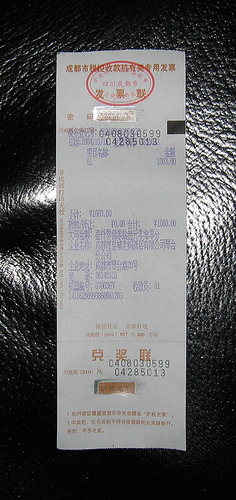Using Lottery Payouts to Fight Tax Evasion?
Yesterday we gave an update on how attaching a lottery payout to bank accounts can help people save more money. A reader named Drew writes in about a different lottery nudge:
When I was studying abroad in China (2006) a friend told me that I should always insist on getting the receipt whenever I ate at a restaurant, because the receipts are scratch-off lottery tickets.
I didn’t think very much of it at the time (as a visitor, I didn’t think I’d ever collect any winnings), but one of the Freakonomics podcasts that talked about capturing unreported income (I think it was “The Tax Man Nudgeth“) reminded me of their ingenious system to encourage customers to demand that restaurants report their income.
I wasn’t sure if it was still going on, but this blog suggests that it still was at least a year ago. Here is an older post with a little bit more detail about the system.
It’s apparently known as fapiao, and here, from the second link Drew sent, is a description:
Fapiao is a bill; a receipt; an invoice, paper to support warranty and contract, further more, it is a state lottery. It is in fact all of the above. To many foreigners, they do NOT value this piece of paper, thinking it is simply for tax purpose, and they do not have to declare their income in China, so fapiao is useless to them.
The fapiao system is used by Chinese tax authorities to calculate and collect business taxes as well as to deter tax evasion. A fapiao is provided by businesses to consumers for the amount of services or goods rendered much like a receipt.
However, there are some big differences between a receipt and a fapiao:
- Fapiao are issued in denominations, like currency.
- Fapiao also generally do not itemize what the purchase was for.
- Some stores that deal a lot with expatriates will issue a receipt; others will only give a fapiao.
- Some will provide both, and a few will not give either (avoid those places)!
- Fapiao sometimes include scratch off panels concealing authentication passwords that can be redeemed for prizes in a lottery format.


Comments